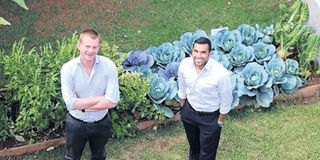Solar-powered kit brightens farmer’s trade

PHOTO | COURTESY SunCulture founders and managers Charles Nichols (left) and Samir Ibrahim.
What you need to know:
- Kit makers are piloting a mobile phone app that would help run the system remotely
- Samir Ibrahim and Charles Nichols, co-managing directors at SunCulture, the firm behind Mr Kimani’s turnaround explained how they came up with the system.
- According to Mr Samir, many Kenyan farmers who do not have an access to good rainfall rely on petrol water pumps and flood irrigation methods.
Unreliable weather patterns had seen Peter Kimani record poor returns in his farm for years on end. But not any more. Mr Kimani, a vegetable farmer in Ngecha, Limuru, is now reaping big thanks to new technology.
Today, he uses a solar-powered kit to pump water from the source, then by drip, irrigate and fertilise crops in his farm.
Samir Ibrahim and Charles Nichols, co-managing directors at SunCulture, the firm behind Mr Kimani’s turnaround explained how they came up with the system. SunCulture designs and sells solar-powered irrigation kits and offers agricultural services that help make it cheaper and easy for farmers to grow fresh fruits and vegetables.
“After securing Sh20 million ($230,000) seed capital, we left our jobs in New York in October, 2012, and relocated to Nairobi to test the product and its viability in Kenya,” said Mr Samir.
The pair founded the firm in May 2012 and after field trials, they began sales a year later: “SunCulture’s kit delivers water directly to crop roots, resulting in yields of up to 300 per cent and water savings of 80 per cent,” said Mr Nichols.
The kit also uses another technology, venturi fertigation, to fertilise plants through the drip irrigation system.
According to Mr Samir, many Kenyan farmers who do not have an access to good rainfall rely on petrol water pumps and flood irrigation methods.
He says that 83 per cent of the 5.4 million hectares of arable land in Kenya is unsuitable for rain-fed agriculture and is therefore in need of irrigation and pumping technology.
“By utilising SunCulture’s kit, the typical farmer saves Sh94,000 ($1,100) on fuel, labour, and fertiliser per growing season while increasing revenues by Sh301,000 ($3,500) per season due to increased crop yield,” he points out.
Mr Kimani, used to make meagre returns from maize and potatoes while relying on rain. But after installing the kit, he is now growing cabbages, onions, tomatoes, and sweet pepper, and vegetables through irrigation.
He says the kit comes in handy for him especially now that he is able to monitor the amount of water and fertiliser used.
“Before installation, SunCulture analysed my soil to determine the amount of water I need. This minimises losses especially in terms of fertiliser used which means I save a lot by giving the crops just the right amount of these essentials,” said Mr Kimani.
Due to high fuel costs and lack of rural electrification, most Kenyan farmers are unable to afford irrigation systems. SunCulture aims to have 1,500 acres of land irrigated using their kit by the end of 2015.
It also has plans to partner with local financial institutions to provide funds to farmers to purchase the system: “We are in talks with Equity Bank for a partnership where the bank will finance the farmers to buy the kits,” said Mr Samir.
MOBILE PHONE APP
The company plans to introduce a mobile phone app that will enable farmers to control the irrigation system. The app is currently on a pilot stage.
“By use of a text message, a farmer can instruct the valves to either open or close from anywhere, which also gives the farmer freedom to run other errands,” noted Mr Nichols.
Unveiling of the solar-powered kit comes at a time that the ministry of Agriculture is working towards increasing the amount of land under irrigation in an effort to change over-reliance on rain-fed farming which results to losses when the rains fail.





